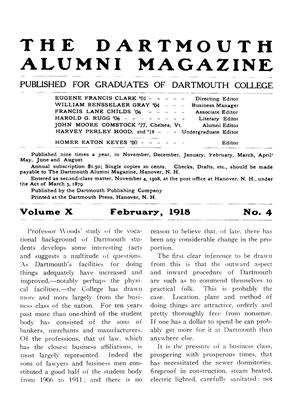Dr. Royal Hatch died in Wellesley, Mass., December 30, of pneumonia, with which disease he was taken on the 17th.
He was born in Strafford, Vt., August 20, 1878, his father being Royal A. Hatch, and fitted at St. Johnsbury Academy. He was a member of Delta Kappa Epsilon and Phi Beta Kappa.
After graduation he entered Harvard Medical School, from which he graduated in 1904. He then became connected with the Massachusetts General Hospital, being house officer and later assistant superintendent. In 1908 he established himself in private practice in Wellesley, acquiring a constantly growing practice, to which he has assiduously and successfully devoted himself.
He was early elected to the Wellesley Board of Health, and was its chairman at his decease. He was a Mason, a member of the Massachusetts Medical Society, and of the Wellesley Home Guards. He was an active and loyal member of the Wellesley Congregational church, of which he was chosen dea- con in January, 1915. His pastor gives this tribute in a local paper: "He never spared himself; his life was as truly a sacrifice as if he had spent it on a field of battle or in some military hospital, where at times he longed to be. He was a man of deep and settled religious convictions, a man of prayer, a Christian who made his life his creed. In a very literal way he followed the footsteps of his Master, who 'went about doing good'. He was a lover of music, and would add his rich bass to the church choir when other duties allowed. Friendship was another prominent characteristic of this man's life—he made friends because he himself possessed the heart of a friend."
In the summer of 1914 Dr. Hatch was married to Edith Frances Noera of Waterbury, Conn., who survives him, with two children.
The following additional paragraphs have been received from the secretary of the class:
The class of 1900 has suffered a severe loss in the death of Dr. Royal Hatch. He had recently attended the funeral of his classmate Norris, where he served as pallbearer, and it was there that he last came into association with any of the men of 1900. The severity of this first war winter had placed an unusually heavy burden of work upon him as a practicing physician. He had been called on day and night alike, and had given himself with unceasing loyalty to his patients. For three nights before his fatal illness came he had been almost continuously on duty. When at length, exhausted by his unselfish work for others, he was attacked by pneumonia, he had no reserve of strength for combating the disease. After a gallant two weeks' fight, he succumbed. He leaves a wife and two children, — Mariana, two and one-half years of age, and Royal, Jr., of less than a twelvemonth.
At the funeral services, which were conducted by Hatch's brother-in-law, President Benjamin T. Marshall, 1900 was well represented. Phillips, McDavitt, Rich, Atwood, Sampson, and Emerson of the class acted as pallbearers, and were assisted by Andrew Marshall '01 and Alfred Hastings '05.
Willingness to undertake heavy responsibilities and unswerving loyalty to them when undertaken were characteristics of Roy Hatch. That is why, in spite of a disposition retiring and almost shy, he numbered so many devoted friends. As men came to know him, they invariably trusted him, and, as the nobility of his modest nature was gradually revealed, they learned to love him.
And he in his quiet way responded. He took his friends intimately into his life. For his loyalties were so large a part- of him that they left no room for small, mean things: for envy, malice, or greed. His ideals as a man were the same fine, unsullied ideals that he had cherished as a boy in the hills and as a youth in the College.
When such a man dies, the whole world is poorer, and the company of those that knew him and called him friend is indeed bereft.
 View Full Issue
View Full Issue
More From This Issue
-
 Article
ArticleCOLLEGE NEWS
February 1918 -
 Article
ArticleVOCATIONAL BACKGROUNDS AND COLLEGE CAREERS
February 1918 By Erville Bartlett Woods -
 Article
ArticleProfessor Woods' study of the vocational
February 1918 -
 Article
ArticleMORE LETTERS FROM FRANCE
February 1918 -
 Books
BooksA Bishop's Message
February 1918 By J. L. M. -
 Article
ArticleTHE INTERCOLLEGIATE INTELLIGENCE BUREAU IN 1918
February 1918 By William McClellan








